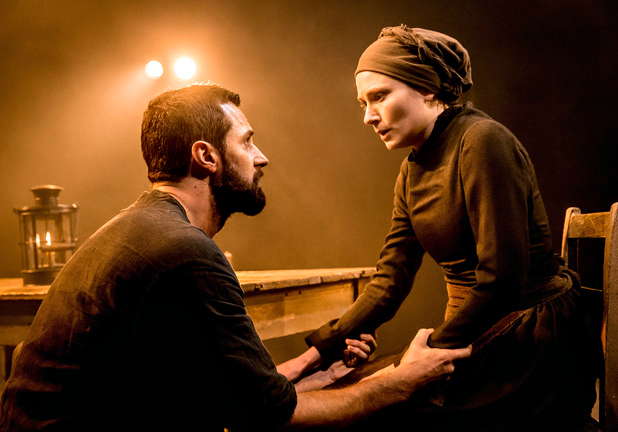The Crucible
"How may I live without my name? I have given you my soul; leave me my name!" - John Proctor, Act IV
Powerful words for a powerful play. Portentous, too.

On the 14th and 18th of August, I was fortunate enough to see the Old Vic's production of The Crucible, a play written by Arthur Miller in 1953. Set in 1692 Salem, it follows the small, repressed community during its infamous witch trials, focusing on John Proctor (Richard Armitage) and the two women in his life. A decent if flawed man, Proctor has just ended a brief, heated affair with the family's maid, Abigail Williams (Samantha Colley), and is striving for redemption from his sin. It is this event that propels the townspeople down a hellish path, which inevitably leads to tragedy.

The Old Vic's version of the play is unique in two ways. First, it is performed "in the round." This configuration places the stage and the first two rows of seats on the same level, allowing the people sitting in those rows to be extremely close to the action. Second, it is directed by Yäel Farber, who is well-known for her intense productions. The Crucible is no exception. It is gritty, tense, violent, poignant, and, at times, a bit frightening. The lighting, props, and music all add to the miserable atmosphere looming over the characters. The theater is dark for much of the play, with the occasional scene lit in oranges or yellows or blues. Furniture, when present, is old and rough. There is almost a constant haze of "smoke", initially as an incense, then as a result of the witch-burnings. And Richard Hammarton's eerie score provides the perfect accompaniment to the drama unfolding onstage. But all these accouterments, while helping to convey the dismal mood, would be nothing without the characters or the actors who inhabit them.

Richard Armitage's Proctor goes from brooding to roaring to weeping in the blink of an eye. He is electrifying and powerful, raw and tortured, shouting his frustrations and wailing his grief. It is a very physical role, in which the body and voice vie for dominance. And when one is in the front row, sometimes only inches away from Armitage, that combination can be a little daunting. Proctor's scenes with Abigail are violently suggestive, as he flings her across the stage, towers over her, and presses her into a table to subdue her. Yet the moments with his wife, Elizabeth (Anna Madeley), are often so tender that they leave the heart aching. The range is enough to give a person emotional whiplash, but it also exemplifies Proctor's internal struggle with morality. He yearns to be a "good man," but his attempts are thwarted in one way or another. Abigail is the temptress, the vindictive spurned lover who will do anything and everything to lure him back, while Elizabeth is the dutiful but frigid wife, waiting with supper for her husband to return. As Proctor must choose between the two women, so, too, will he need to decide if the price of being a "good man" is worth it.

Although the subject matter of the play is itself a tad frightening, it is Samantha Colley's performance as Abigail Williams that sends an ominous chill up the viewer's spine. With the ultimate goal of attaining Proctor, she forces the other girls in the village to pretend to be possessed by the Devil. This leads them to accuse the older women, including Elizabeth Proctor, of causing their afflictions. Abigail is terrifying in her malice and manipulation, but most of all, in her ability to lead the girls into her frenzied vendetta. They flock to her, like sheep to a shepherd, knowingly and unflinchingly condemning innocents to death.
 Thus, the audience is engrossed, sometimes unwillingly but almost always uncomfortably. Farber's five-star rendition toes the line between emphatic and exaggerated, which is, I suspect, intentional. Having read the play and watched the film (with Daniel Day-Lewis as John Proctor), I can honestly say that neither was as memorable nor as haunting as this version. This one burns and continues to smolder even after the fire is doused. It left me feeling unsteady without understanding why. And nearly two months later, I can still hear Proctor pleading with the court to leave him his name and reputation, if not his life.
Thus, the audience is engrossed, sometimes unwillingly but almost always uncomfortably. Farber's five-star rendition toes the line between emphatic and exaggerated, which is, I suspect, intentional. Having read the play and watched the film (with Daniel Day-Lewis as John Proctor), I can honestly say that neither was as memorable nor as haunting as this version. This one burns and continues to smolder even after the fire is doused. It left me feeling unsteady without understanding why. And nearly two months later, I can still hear Proctor pleading with the court to leave him his name and reputation, if not his life.






